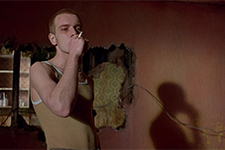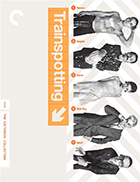Trainspotting (4K UHD)
|  When writing about Danny Boyle’s breakout indie hit Trainspotting, it is difficult, if not impossible, to not start at the beginning—a problem that has clearly been faced by other writers given the number of reviews that begin with a discussion of the opening sequence. And why not? The opening six minutes of Trainspotting are as propulsive, enveloping, and utterly engaging as any six minutes ever committed to celluloid. It is a tour de force—a cinematic adrenaline shot propelled by the rhythm of the protagonist’s brutally honest voice-over narration and the thump-thump editing that works in concert with Iggy Pop’s pounding 1977 anthem “Lust for Life” (rarely has sound and image and tone and theme ever been so perfectly aligned). It is mordantly funny, brilliantly conceived, and a case study of narrative economy, introducing us to all the major characters, their blighted Edinburgh neighborhood, and their shared plight of drug addiction. Trainspotting reunited director Danny Boyle with screenwriter John Hodge, producer Andrew Macdonald, and actor Ewan McGregor, all of whom collaborated two years earlier on Boyle’s feature debut, the brutal, cynical thriller Shallow Grave (1994), which writer Duncan Petrie fingered as the progenitor of a “New Scottish Cinema.” Whatever that film suggested about Boyle’s potential as a feature filmmaker was absolutely confirmed by Trainspotting, which took both Scottish and international cinema by storm. Set in Edinburgh’s dilapidated, working-class neighborhoods, which were far from the tony New Town section where Shallow Grave was set, Trainspotting delves deep into the world of heroin addiction and the generation of Scottish twentysomethings held in its poisonous thrall. As the central character, a lanky, narcissistic junkie named Mark Renton (McGregor), openly tells us, “I chose not to choose life. I chose something else. And the reasons? There are no reasons. Who needs reasons when you’ve got heroin?” That is one way to put it, and bluntly at that, but there is a hard truth to Renton’s declaration that suffuses Trainspotting’s manic energy. As Renton explains it, there are no reasons beyond the heroin itself. Drugs take him and his friends away from their problems, so the only problem they are left with is how to get more drugs. As long as they are high, they are okay. Therefore, heroin becomes the end-all be-all of existence, dramatized in a grotesquely comical scene in which Renton literally climbs into the self-proclaimed worst toilet in Scotland to retrieve some. The meandering, episodic plot (the cult novel on which it is based by Irvine Welsh is more of a collection of short stories than a coherent narrative) follows the misadventures of Renton and his mates: Sick Boy (Jonny Lee Miller), Spud (Ewen Bremner), Tommy (Kevin McKidd), and Begbie (Robert Carlyle). Tommy is the one clean member of the group, that is, until his girlfriend breaks up with him. Begbie doesn’t do drugs either, but he is an alcoholic sadist with no respect for human life. In many ways he is the most dangerous member of the group because he lacks anything resembling empathy. Renton, Sick Boy, and Spud spend a great deal of their time holed up in a dingy flat owned by their drug source, a dealer named Mother Superior. They make various half-hearted attempts at getting jobs, but most of their time is spent stealing from anyone and everyone, even from retirement homes and their own parents. Drug addiction is their shared connection, and absent it there is no sense of why any of them would be friends. Later in the film, when Renton finally gets clean and starts working at a legitimate job in London, he doesn’t even miss them. Without the heroin, they have little to connect them. When Renton’s friends start showing up unexpectedly at his flat looking for a place to live, it is obvious how unfun they are when he is sober. When Trainspotting was originally released, there was consternation in some quarters that it glorified heroin addiction—or at least made it seem appealing. And it is true that the film does not shy away from the pleasures of drug use. As Renton puts it, “People think [heroin addiction] is all about misery and desperation and death and all that shit, which is not to be ignored, but what they forget is the pleasure of it. Otherwise, we wouldn’t do it. After all, we’re not fucking stupid.” Renton describes a heroin high as “the best orgasm you’ve ever had, multiply it by 1,000, and you’re still nowhere close.” This is important because it gives a framework for understanding the characters’ actions. They are not stupid and they are not victims. They make a conscious choice to continue doing heroin, and the film traces what that choice exacts from their lives and the lives of those around them. It shows in great, often distressing detail how drugs rule them—how they can’t do anything without taking a hit first, so they are reduced to sensory-overloaded addicts who can’t enjoy anything else. As he did in Shallow Grave, but even more so here, Boyle proves to be a master alchemist who mixes black humor, harsh reality, and surrealist detours. At the time, Trainspotting looked and felt like nothing else in its assemblage of brash cinematic references (A Clockwork Orange, A Hard Day’s Night); slow motion, fast motion, colored filters, hand-held cameras, and extreme close-ups.; graphic depictions of drug use and explicit sex; disturbing, nightmarish hallucinations; and not one, but two jaw-dropping scenes of hilariously gross scatological humor. It should all be too much, but it never is because the film’s wild, joyriding tone fits the characters’ lives so perfectly, drawing us into the bum-rush of their addiction and then slamming us (and them) upside the head with the brutal consequences. It is a daring, invigorating film that celebrates life without mincing the depths of despair and the omnipresence of death. The humor is real, but so are the gallows.
Copyright © 2024 James Kendrick Thoughts? E-mail James Kendrick All images copyright © The Criterion Collection | |||||||||||||||||||||||||||||
Overall Rating: 


 (4)
(4)


